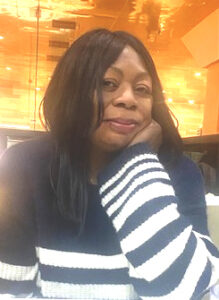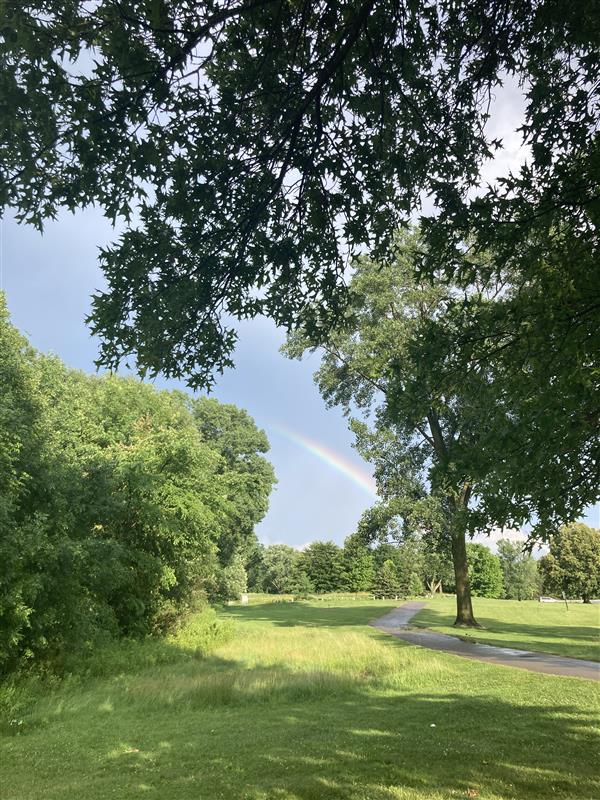By Margaret Lombe
My reflection is informed by Catholic social teaching and centers on finding and hearing the voice of God in a wounded world. I often ponder on the question “How do I witness to the gospel values in love and truth amid the many wounds that characterize our world today, wounds of systemic inequalities, environmental trauma, racism, polarization, violence, indifference, and political tumult?
Like many teachers, I am confronted with questions from my students. One student who was part of a recent engagement with refugees in Kakuma Refugee camp in Kenya asked in a lengthy email, “What do I do? What do we do?’ At that camp we worked with refugee men, women, and children who are struggling with many challenges, including food insecurity, as a result of the recent cuts to USAID. It is hard to know how to respond.
Another student struggling with the plight of our undocumented sisters and brothers in this country asks the same questions: “What do I do? What do we do?’ Another asks “How do I advocate for the people of Ukraine, the Gaza?” I can go on and on. My challenge is that I don’t have well-thought-out answers to guide my students. What I offer them is an invitation to stand with and in solidarity! In a culture that champions quick action-oriented responses, and indeed from a social work perspective, solidarity seems inadequate! My students, as you can imagine, are often disappointed and disillusioned. They despair!
The solidarity that I call my students to, in a sense, is an invitation to witness to the gospel values in love and truth! It is an invitation to hear the cry of the earth and the cry of the poor, which Pope Francis called for in his encyclical Laudato Si’. It is an invitation to see the face of Jesus—true God and true human—in both our wounded and affluent sisters and brothers. Solidarity opens our hearts to the fear in eyes of our undocumented sisters and brothers and to feel their yearning for accompaniment. It helps us feel the betrayal of citizens of all economic statuses robbed of their fundamental rights through redistricting and to see the God who hungers and thirsts in those who have abundance while also knowing the pain and suffering that will come to many impoverished people as cuts to welfare programs take away their lifeline.
Today, our world in its complexity is shrouded in uncertainty and fragmentation, and loaded with questions and demands that can lead to disillusionment. Yet, this moment demands that, in solidarity, we stop and ponder as we search for a sense of direction. It is in solidarity that I find the grace to take a pause and say, ‘Lord teach me/us to pray’ (Luke 11:1). In solidarity, I find the courage to surrender my premeditated action-oriented responses and plans and seek the ‘still small voice’ (1 Kings 19: 11-13) that gives direction, purpose, and meaning, enabling me to witness to the gospel values in love and truth amid our world’s many wounds.
In the old song, Lord, Teach Us to Pray, (available at https://springfieldop.org/TeachUs) written by Ray Repp and sung by Joe Wise, the refrain calls “Lord, teach us to pray, it’s been a long and cold December kind of day. With our hearts and hands all busy in our private little wars, we stand and watch each other now from separate shores. We lose the way.”
Perhaps standing in solidarity with those who suffer the worst effects of a growing global authoritarianism is its own kind of prayer, one that has the potential to crack through the cold December days of our age.

Margaret is associate professor of social work at Boston University and director of their BRIDGE program specialization in global health, social policy, and poverty. She is a Springfield Dominican Associate.



Can’t believe I’m just getting around to reading this. Beautifully written and comforting. “Perhaps standing in solidarity with those who suffer the worst effects of a growing global authoritarianism is its own kind of prayer, one that has the potential to crack through the cold December days of our age.” And so I pray.